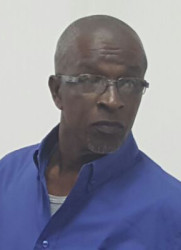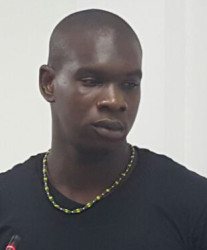Deputy Director of Prisons Gladwin Samuels was once again accused by an inmate as being the authority who passed an instruction for the door to the burning Capital Division at the camp Street prison to be shut on March 3, when 17 prisoners died.
Kenneth Griffith, who is a resident of Capital Block C, located just below the Capital A division, testified yesterday at the Department of Public Service building that he was at the western window and could see smoke coming from the division above.



He told the Commission of Inquiry (CoI) into the prisoner deaths that Samuels called for the officers, who had gone upstairs to retrieve the remaining prisoners after a standoff between the prisons task force and inmates Steve Allicock and Collis Collison caused them to retreat to their dorm. When they came, he enquired whether they had been responsible for the fire started upstairs. When they replied no, Griffith alleged that the Director told the officers, “If y’all ain light no fire, lock the door and let they s***t bun.”
The inmate related that he tried reasoning with Samuels, who had been standing not far from where he was, to let the men out, while pointing out that regardless of the situation, prisoners were people too.
Samuels, however, reportedly left and stood some distance away with his arms folded, watching on.
Griffith related that it was sometime later that he saw Samuels go up to the Capital B block. He recalled also that soon afterwards, on the orders of Kevin Pilgrim, the Officer in Charge (OC) of the prison, officers ran up to the division with tools. Upstairs, he said, he could hear inmates running about and shouts of “murder.”
Trouble in the camp
Murder accused, Trevor Williams, of the Capital B Division, spoke of tension between the Deputy Prisons Director and Pilgrim on the day of the fire.
According to Williams, after the door to Capital A had been shut, the officers began to escort prisoners out of the Capital B dorm. He testified to seeing rocks being thrown at the officers, including at Samuels, but denied seeing liquids being thrown, as has been continuously claimed by Selwyn Pieters, the joint services attorney.
He related that Pilgrim told the inmates to use the stairs closest to Capital A, but his direction was overruled by Samuels, who told him to “shut up” because he [Samuels] was leading the exercise, and instructed that they use the stairs to Capital B instead.
The prisoner stated that within five minutes, he saw black smoke rising from Capital A and inmates began hollering for help.
Another inmate, Desmond James, who was one of those who was caught in the blaze but managed to escape with only burns to his knee, had also testified last month that Samuels had ordered that the door to the Capital A section be closed prior to the fire.
Samuels has sent on six weeks’ leave in the wake of allegations made against him by inmates after the fire.
Mastermind
Under re-examination, Williams, who claimed to have seen the entire incident involving Collison and the task force, related that a warden told him Collison was targeted by the officers because he was considered a mastermind.
When Collison was called to present further evidence yesterday, under re-examination by Commission Counsel Excellence Dazzell, he stated that while sometimes searches would go smoothly, other times, inmates would start rows. He stated further that when these inmates did not “simmer down,” they would be placed in lockdown. He also testified to seeing prisoners being beaten and even sent out of prison if they did not comply.
Collison, who two weeks ago spoke of being aggressively handled by officers who had rushed him with shields, thrown him to the ground, and dragged him along the tarmac before taking him to the reception area, said yesterday that he had lost consciousness for a few minutes after they dropped him to the ground, causing him to hit his head.
When Pieters suggested that he had resisted the officers and even threatened their lives, Collison denied these claims. He also denied Pieters’ suggestion that he was aware that when he was taken to the reception area, he would have been moved to another prison.
The CoI began on March 10 and ran for three weeks before coming to an end on March 28. A further extension of two months was granted for the CoI, which resumed yesterday.





